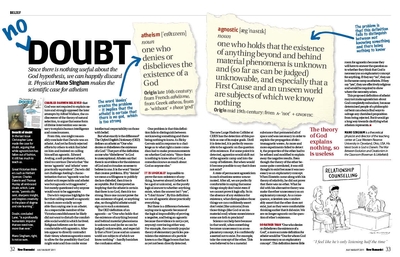 Charles Darwin believed that God was not required to explain nature and strongly opposed the later attempts by Alfred Wallace, the co-discoverer of the theory of natural selection, to argue that some form of divine intervention was necessary to explain human intelligence and consciousness.
Charles Darwin believed that God was not required to explain nature and strongly opposed the later attempts by Alfred Wallace, the co-discoverer of the theory of natural selection, to argue that some form of divine intervention was necessary to explain human intelligence and consciousness.
From this, one might reasonably conclude that Darwin was an atheist. And yet he firmly rejected efforts by others to stick that label on him and insisted on calling himself an agnostic. Edward Aveling, a self-professed atheist, tried to convince Darwin that “the terms ‘agnostic’ and ‘atheist’ were practically equivalent”. Darwin did not challenge Aveling’s characterisation that an “agnostic was but atheist writ respectable and atheist was but agnostic writ aggressive”, but merely questioned why anyone would want to be aggressive.
Darwin’s response highlights the fact that calling oneself an agnostic is much more socially acceptable than saying one is an atheist. As a respectable member of the Victorian establishment he likely did not want to disturb the comfortable social world in which he lived. Religious believers are far more comfortable with agnostics. Atheists appear to directly contradict their views; whereas agnostics seem to allow for the possibility that God might exist and thus confer some intellectual respectability on those with belief.
But what exactly is the difference? The Oxford English Dictionary (OED) defines an atheist as “One who denies or disbelieves the existence of a God.” That part of the definition as one who “disbelieves” in God is unexceptional. Atheists say that there is no evidence for the existence of God and so it makes no sense to believe in one. It is the word “denies” that creates problems. If by “denies” we mean a willingness to publicly declare disbelief, then it too is acceptable. But if interpreted as implying that the atheist is certain that there is no God, then it is too strong. Since one cannot prove the non-existence of a god, or anything else, no thoughtful atheist would sign on to such a statement.
The OED definition of an agnostic – as “One who holds that the existence of anything beyond and behind material phenomena is unknown and (so far as can be judged) unknowable, and especially that a First Cause and an unseen world are subjects of which we know nothing” – hardly banishes the confusion either.
One problem is that this definition fails to distinguish between not knowing something and there being nothing to know. As Ricky Gervais said in response to a challenge as to what right a mere comedian had to make pronouncements on whether God exists; “Since there is nothing to know about God, a comedian knows as much about God as anyone else.”
It is logically impossible to prove the non-existence of anything, however absurd (whether it be a god or unicorns), so the purely logical answer to whether anything exists, when the answer isn’t “yes”, is “I don’t know”. By this definition we are all agnostic about practically everything.
But there is a difference between saying one is agnostic because of the logical impossibility of proving a negative, and being an agnostic because the evidence is not (as yet, anyway) convincing either way. For example, the currently popular theory of elementary particles postulates the existence of a particle known as the Higgs boson that has as yet not been directly detected. The new Large Hadron Collider at CERN has the detection of this particle as one of its major goals. Until it is detected, it is perfectly reasonable to be agnostic on the question of its existence. If at some point it is detected, agnostics would shift out of the agnostic camp and into the camp of believers. But when would it become possible to say that it does not exist?
A state of permanent agnosticism in such situations seems unwarranted. After all, we are perfectly comfortable in saying that some things simply don’t exist even if we cannot prove it logically. So in the absence of any evidence for existence, what distinguishes those things we can confidently assert don’t exist (like unicorns) from those things (like God or an immaterial soul) whose nonexistence some are loth to proclaim?
Science can help here because in that world, when something becomes unnecessary as an explanatory concept, it is confidently asserted not to exist. For example, take the concept of the ether. This was believed to be a material substance that permeated all of space and was necessary in order to explain the propagation of electromagnetic waves. As more and more experiments failed to detect it, the properties of the ether had to be refined and modified to explain away the negative results. Even though the theory of the ether became quite convoluted, it was still thought to exist because it was necessary as an explanatory concept. When Einstein came along with his theory of relativity, he did not prove that there was no ether. What he did with his alternative theory was make the ether unnecessary as an explanatory concept. As a consequence, scientists now comfortably assert that the ether does not exist, just as they were comfortable thinking earlier that it did exist. We are no longer agnostic on the question of ether’s existence.
So rather than “One who denies or disbelieves the existence of a God”, a more accurate definition for atheist would be “One for whom God is unnecessary as an explanatory concept”. This definition leaves little room for agnostics because they will have to answer the question as to whether they think that God is necessary as an explanatory concept for anything. If they say “no”, they are in the same camp as atheists. If they say “yes”, they are effectively religious and would be required to show where the necessity arises.
This proposed definition of atheist may not make agnosticism about God completely redundant, because determined people of a philosophical bent can always find ways to salvage any cherished proposition from being rejected. But it would go a long way towards clarifying what atheism represents.

